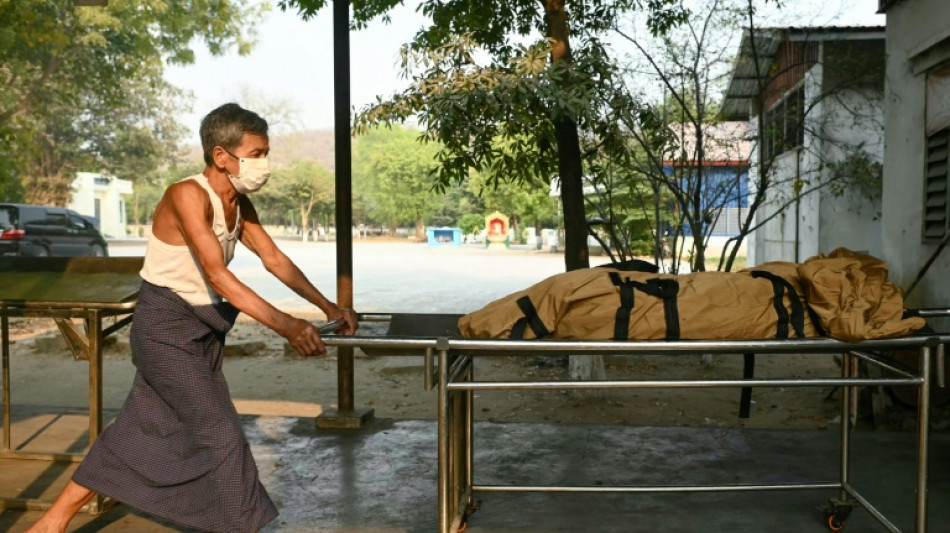
'Noble work' of Buddhist cremations after Myanmar quake

The baby was born in the aftermath of Myanmar's earthquake and given to the flames of Buddhist funeral rites two days later, too young to have been named.
The child's pregnant mother was knocked over by the force of the quake while working in a paddy field, said grandmother Khin Myo Swe, and gave birth the following day.
The baby was brought to a hospital in Mandalay to be incubated, but died on Monday.
"We are all living in hardship," wept Khin Myo Swe as an ambulance worker gently cradled the little body before a Buddha statue decorated with flowers, then took it away to be cremated.
Three days after a 7.7-magnitude earthquake struck central Myanmar the death toll has hit 2,056, with more still buried in the remnants of ruined buildings in the nation's second city.
Since the quake hit Friday, ambulances have been bringing the remains of the dead to the crematorium in the Kyar Ni Kan neighbourhood on the outskirts of Mandalay.
- 'What others cannot' -
Some 300 bodies have been delivered in total, more than 100 on Sunday alone, forcing them to work six hours beyond their usual closing time.
Some vehicles peel in with frenzied haste. A crew of men say they are bringing a 16-year-old female quake victim.
The bundle of cloth they deposit before the crematorium's sliding metal door is much shorter than a typical teenage girl and one man retches as they bundle back in the van.
They do not speak as they leave the crematorium lot -- eager to ferry her clothing home to bring her soul back to her family.
Nay Htet Lin, the head of another four-man crew who have brought in around 80 bodies since the quake, said: "On the first day of the earthquake, we helped injured people get to hospital.
"On the second day, we had to carry only dead bodies."
- Cleansing fire -
Cremation is a core tenet of the Buddhist faith, with adherents believing it frees the soul from the body and facilitates rebirth in a new life.
In some Asian cultures, those who deal with the dead are regarded as outcasts, on the margins of society.
But Nay Htet Lin told AFP it was "noble work".
"We are doing what other people cannot," he said. "We will have a good next life."
One 15-year veteran crematorium staffer had no regrets over his choice of workplace, even as he witnessed a parade of anguish.
"Everyone is coming here with their sad feelings, with their suffering," said the 43-year-old, asking for anonymity as he was not authorised to speak to the media.
"When they come here I also work for them."
- Food offering -
Much of the focus of rescue teams has been in urban Mandalay where apartment complexes have been flattened, a Buddhist religious complex eviscerated and hotels crumpled and twisted into ruins.
At some disaster sites the smell of rotting bodies is unmistakable.
Khin Myo Swe's short-lived grandchild was the 39th body delivered on Monday. She said the baby's mother had not yet been told of her child's death.
It costs less than $3 at free-market rates to cremate an adult in the diesel-fuelled facility, and half that for an infant.
"I had to lie to my daughter, telling her I left the baby in hospital," said Khin Myo Swe, 49.
"If I tell her now I'm worried the shock would kill her too.
"I will send food as an offering to the monastery for the baby's soul."
W.Hansen--BlnAP

 London
London

 Manchester
Manchester
 Glasgow
Glasgow
 Dublin
Dublin
 Belfast
Belfast
 Washington
Washington
 Denver
Denver
 Atlanta
Atlanta
 Dallas
Dallas
 Houston Texas
Houston Texas
 New Orleans
New Orleans
 El Paso
El Paso
 Phoenix
Phoenix
 Los Angeles
Los Angeles



